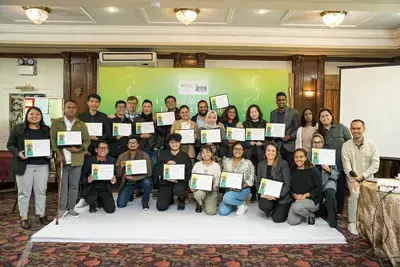
Success Story
Evening at the Woolly Mammoth Theatre Celebrates Freedom and Creativity
The contrasts between the creativity that democracy can bring and the stifling of imagination in closed societies like North Korea was the topic of an evening at the Woolly Mammoth Theatre in Washington, D.C., Nov. 14 organized by the theatre and NDI.
The evening featured You for Me for You, a play written by Korean American playwright Mia Chung, which tells the story of two sisters and their attempt to flee North Korea for the United States. It was accompanied by an art exhibit in the theatre lobby by world-renowned North Korean artist and political dissident Song Byeok. A former state-sponsored propagandist turned satirist, Song Byeok escaped from North Korea in 2001. His paintings will be featured at Woolly Mammoth, along with the play, through Dec. 2.
A small reception before the show featured comments from Carl Gershman, president of the National Endowment for Democracy; Dan Baer, deputy assistant secretary at the State Department’s Bureau of Democracy, Human Rights, and Labor; and Kathleen Stephens, former U.S. ambassador to Korea.
“Until you have democratic institutions, until you have human rights, people don’t create,” Stephens said. Song Byeok’s achievement is “a symbol of the kind of creativity that only democracy supports” as well as “a testimony to the resilience of the human spirit, and the resilience of the Korean people.”
The program concluded with a moving account from Song Byeok of the trials he faced while living in North Korea and his escape to the South. “I have been learning what freedom and human rights is,” he said through a translator, noting that he had dedicated his art to the people of North Korea.
Byeok’s D.C. exhibit features satirical paintings of former North Korean leader Kim Jong-il. One of the most eye-catching shows the “Dear Leader” dressed as Marilyn Monroe. Others depict images of his recent artistic freedom—his own form of protest against the harsh regime that once held him prisoner. Byeok continues to work under an assumed name to protect family and friends still in the country.
Published Nov. 21, 2012



